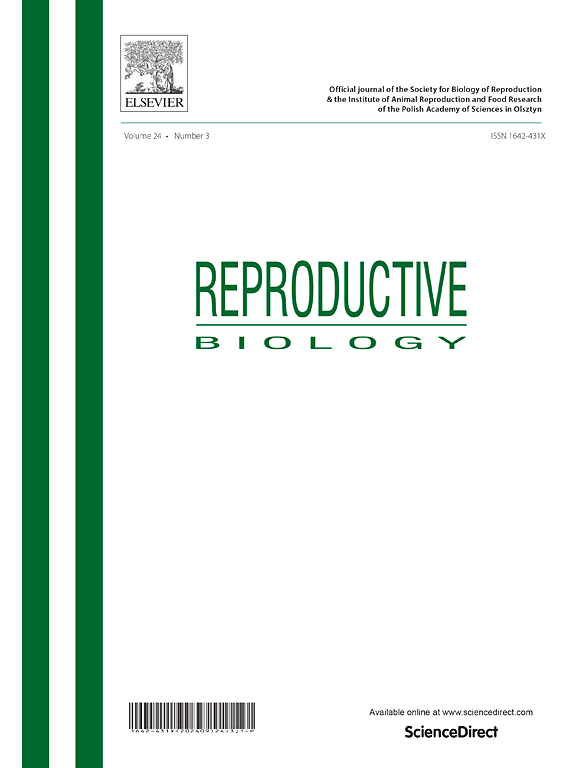烟酰胺单核苷酸对大豆异黄酮致小鼠睾丸损伤的保护作用。
IF 2.5
3区 生物学
Q3 REPRODUCTIVE BIOLOGY
引用次数: 0
摘要
大豆异黄酮(Soybean isoflavone, SI)是一种与体内雌激素竞争性相互作用的植物雌激素,可能干扰内分泌平衡、精子发生和睾丸细胞的正常功能。烟酰胺单核苷酸(Nicotinamide mononucleotide, NMN)是一种重要的生物活性物质,可通过降低氧化应激等机制增强器官和组织功能。然而,关于NMN改善植物雌激素诱导的小鼠睾丸发育损伤的能力的信息有限。研究NMN对SI致小鼠睾丸损伤的保护作用。本研究结果显示,si处理小鼠的体重、睾丸指数和生殖相关因子显著降低,细胞凋亡明显增加。RNA测序(RNA-seq)结果表明,暴露于SI导致小鼠睾丸组织中主要在细胞自噬和增殖途径中差异表达基因(DEGs)的富集。200 mg/kg和400 mg/kg剂量的SI可下调小鼠睾丸长寿调节通路中的Rb1cc1基因和cAMP信号通路中的Vav2基因。相比之下,100 mg/kg NMN处理显著减轻了SI引起的不良反应。综上所述,NMN在减轻si诱导的睾丸损伤方面表现出显著的治疗潜力。本文章由计算机程序翻译,如有差异,请以英文原文为准。
Protective effect of nicotinamide mononucleotide against soybean isoflavone induced damage in mouse testis
Soybean isoflavone (SI) was one type of phytoestrogen that competitively interacts with estrogen in the body, potentially interfering with endocrine balance, spermatogenesis, and the normal function of testicular cells. Nicotinamide mononucleotide (NMN), an important bioactive substance, enhances organ and tissue function through mechanisms such as reducing oxidative stress. However, limited information exists regarding the ability of NMN to improve phytoestrogen-induced damage to testis development in mice. The study investigated the protective effect of NMN on testicular damage in mice caused by SI. The results of this study revealed SI-treated mice exhibited a significant reduction in body weight, testicular index, and reproduction-related factors, as well as a marked increase in apoptosis. RNA sequencing (RNA-seq) results demonstrated that exposure to SI led to the enrichment of differentially expressed genes (DEGs) primarily in cellular autophagy and proliferation pathways within mouse testicular tissues. Administration of SI at doses of 200 mg/kg and 400 mg/kg downregulated the Rb1cc1 gene in the longevity-regulating pathway and the Vav2 gene in the cAMP signaling pathway in mouse testes. In contrast, treatment with 100 mg/kg NMN significantly alleviated the adverse effects induced by SI. In summary, NMN exhibited significant therapeutic potential in alleviating SI-induced testicular damage.
求助全文
通过发布文献求助,成功后即可免费获取论文全文。
去求助
来源期刊

Reproductive biology
生物-生殖生物学
CiteScore
3.90
自引率
0.00%
发文量
95
审稿时长
29 days
期刊介绍:
An official journal of the Society for Biology of Reproduction and the Institute of Animal Reproduction and Food Research of Polish Academy of Sciences in Olsztyn, Poland.
Reproductive Biology is an international, peer-reviewed journal covering all aspects of reproduction in vertebrates. The journal invites original research papers, short communications, review articles and commentaries dealing with reproductive physiology, endocrinology, immunology, molecular and cellular biology, receptor studies, animal breeding as well as andrology, embryology, infertility, assisted reproduction and contraception. Papers from both basic and clinical research will be considered.
 求助内容:
求助内容: 应助结果提醒方式:
应助结果提醒方式:


